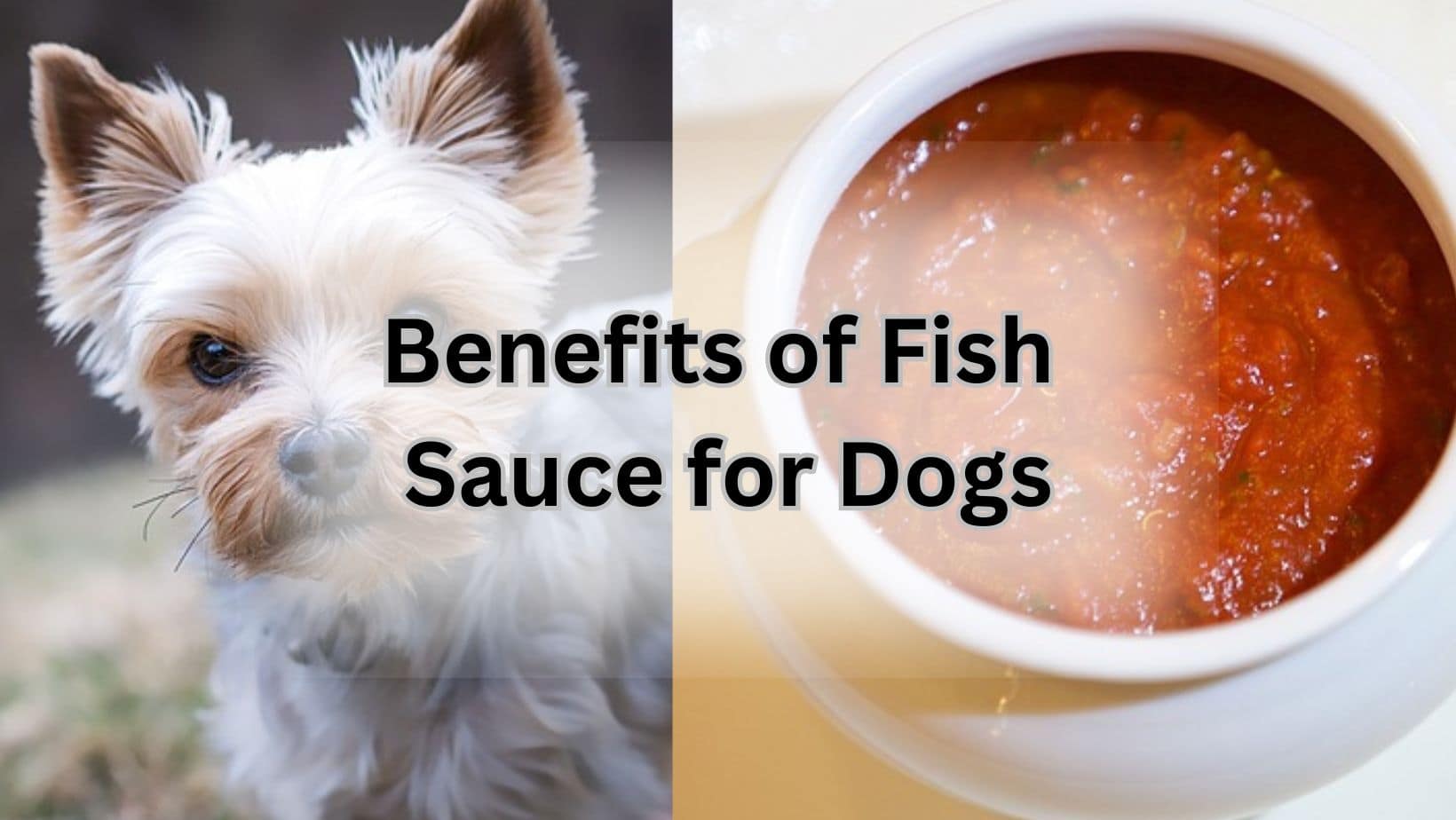“Can Dogs Safely Indulge in Fish Sauce? Discover the Answer!”

Introduction to Fish Sauce for Dogs
Curious about whether dogs can enjoy the deliciousness of fish sauce? Well, you’ve come to the right place! As a passionate Canid Wild Life Lover with 20 years of experience, I’ve explored the world of dog nutrition extensively. Today, we’re diving into the topic of fish sauce for our furry friends.
The short answer is yes, dogs can eat fish sauce, but there are a few things to consider. Fish sauce can be a flavorful addition to their diet, providing essential nutrients and adding variety to their meals. However, it’s important to use it in moderation and choose a high-quality, low-sodium fish sauce without any added spices or ingredients that might be harmful to dogs.
If you’re interested in learning more about the benefits of fish sauce for dogs, the potential risks, alternative condiments, or even some tasty home-cooked recipes featuring fish sauce, keep reading! We’ll cover all these topics and more to ensure you have the knowledge you need to make the best choices for your furry friend.
Benefits of Fish Sauce for Dogs
As a Canid Wildlife Lover with over 20 years of experience, I’ve seen firsthand the incredible benefits that fish sauce can provide for our furry friends. Now, you might be wondering, can dogs really eat fish sauce? The answer is yes, but in moderation and with a few considerations.
1. Nutritional Value
Fish sauce is made from fermented fish, usually anchovies, and salt. It is rich in protein, omega-3 fatty acids, and essential minerals like calcium and phosphorus. These nutrients are essential for your dog’s overall health and well-being.
2. Improved Coat and Skin Health
One of the noticeable benefits of incorporating fish sauce into your dog’s diet is the improvement in their coat and skin health. The omega-3 fatty acids found in fish sauce help to reduce inflammation and promote a shiny, lustrous coat. It can also alleviate dry and itchy skin, making your dog more comfortable and less prone to scratching.
3. Joint Health and Mobility
Just like humans, dogs can suffer from joint issues and arthritis as they age. The omega-3 fatty acids in fish sauce have anti-inflammatory properties that can help reduce joint pain and improve mobility. Adding fish sauce to your dog’s meals can support their joint health and keep them active and playful for longer.
4. Boosted Immune System
Fish sauce contains natural antioxidants that can strengthen your dog’s immune system. These antioxidants help to neutralize harmful free radicals in the body, reducing the risk of chronic diseases and supporting overall well-being.
5. Enhanced Appetite and Digestion
If you have a picky eater or a dog with a sensitive stomach, fish sauce can be a game-changer. The strong aroma and flavor of fish sauce can entice even the fussiest of eaters to finish their meals. Additionally, the probiotics present in fermented fish can promote a healthy gut and improve digestion.
6. Alternative Condiments
If you’re not a fan of fish sauce or want to explore other options, there are alternative condiments that can provide similar benefits for your dog. Some safe and dog-friendly options include bone broth, coconut oil, and plain yogurt. These alternatives can add flavor and nutritional value to your dog’s meals without any potential risks.
Remember, moderation is key when it comes to incorporating fish sauce or any condiment into your dog’s diet. Too much of a good thing can have negative consequences. Always consult with your veterinarian before making any significant changes to your dog’s diet, especially if they have any underlying health conditions.
Risks of Feeding Fish Sauce to Dogs
As a dog owner, you may be tempted to share your love for seafood with your furry friend. After all, who can resist those pleading puppy eyes when you’re enjoying a delicious fish dish? But before you pour that fish sauce on your dog’s dinner, it’s important to consider the risks involved.
1. High Sodium Content
Fish sauce is known for its strong, salty flavor, and this is due to its high sodium content. While a small amount of sodium is essential for dogs, too much can be harmful. Excessive sodium intake can lead to dehydration, increased blood pressure, and even kidney damage in dogs. So, it’s best to avoid feeding fish sauce to your canine companion regularly.
2. Potential Allergic Reactions
Just like humans, dogs can have allergies too. Fish sauce contains various ingredients, including fish, which can trigger allergic reactions in some dogs. Common symptoms of an allergic reaction include itching, redness, swelling, and gastrointestinal issues. If you notice any of these symptoms after your dog consumes fish sauce, it’s important to consult your veterinarian.
3. Fish Bones and Toxins
While fish sauce itself doesn’t contain fish bones, it’s important to remember that fish bones can be present in the actual fish used to make the sauce. Accidentally consuming fish bones can be dangerous for dogs, as they can get lodged in their throat or digestive tract. Additionally, some fish may contain toxins like mercury, which can be harmful to dogs if consumed in large quantities.
4. Alternative Condiments for Dogs
If you’re looking to add some flavor to your dog’s meals, there are safer alternatives to fish sauce. You can try using low-sodium chicken or beef broth as a tasty and safe option. Just make sure to check the ingredients and avoid any broths that contain onions or garlic, as these can be toxic to dogs.
5. Moderation is Key
If you still want to give your dog a taste of fish sauce occasionally, it’s important to do so in moderation. A small drizzle of fish sauce on their food every now and then is unlikely to cause any harm. However, it’s crucial to monitor your dog for any adverse reactions and adjust their diet accordingly.
Remember, while fish sauce may be a flavorful addition to human meals, it’s best to err on the side of caution when it comes to feeding it to your furry friend. Always prioritize their health and consult with your veterinarian before introducing any new foods into their diet.
How Much Fish Sauce Can Dogs Eat?
So, you’re wondering if your furry friend can enjoy the deliciousness of fish sauce. Well, you’re not alone! Many dog owners are curious about what condiments are safe for their canine companions. While fish sauce can add a flavorful kick to your meals, it’s important to know how much is safe for your dog to consume.
Is Fish Sauce Safe for Dogs?
Good news! Fish sauce is generally safe for dogs to eat in small amounts. It’s made from fermented fish and salt, which means it can be a tasty source of protein and minerals for your pup. However, moderation is key. Too much fish sauce can lead to an upset stomach or even sodium poisoning in dogs.
Benefits of Giving Fish Sauce to Dogs
Aside from being a tasty treat, fish sauce can offer some health benefits for your furry friend. It is rich in omega-3 fatty acids, which can promote a healthy coat and skin. Additionally, the protein content in fish sauce can support muscle growth and repair. Just remember, these benefits are only present when fish sauce is given in small quantities.
Alternative to Fish Sauce for Dogs
If you’re looking for a dog-friendly alternative to fish sauce, you can try using plain, cooked fish as a treat or topping for your pup’s meals. This way, you can provide the same nutritional benefits without the added sodium and other ingredients found in fish sauce.
How Much Fish Sauce Can Dogs Have?
When it comes to fish sauce, less is more for your furry friend. A general guideline is to limit your dog’s intake to no more than a teaspoon of fish sauce per day. This small amount should be enough to add some flavor to their meal without overwhelming their system with sodium.
Remember, every dog is different, and some may be more sensitive to certain foods than others. It’s always a good idea to consult with your veterinarian before introducing any new condiments or ingredients into your dog’s diet.
So, go ahead and share a small taste of fish sauce with your canine companion. Just be sure to keep it in moderation and watch for any signs of discomfort or adverse reactions. With a balanced and varied diet, your dog can enjoy a little bit of flavor without compromising their health.
Alternative Fish-Based Foods for Dogs
So, you’re wondering if dogs can eat fish sauce? Well, let’s dive into the world of fish-based foods for our furry friends and explore some alternatives to fish sauce that can be a tasty and healthy addition to their diet.
1. Fish Oil Supplements
If you’re looking to incorporate the benefits of fish into your dog’s diet, fish oil supplements are a fantastic option. They are rich in omega-3 fatty acids, which promote a healthy coat, skin, and joints. Plus, they can help reduce inflammation and support cardiovascular health. Just make sure to consult with your veterinarian to determine the appropriate dosage for your dog’s size and breed.
2. Fresh Fish
Why not give your pup a taste of the real deal? Fresh fish, such as salmon or sardines, can be a nutritious and delicious treat for dogs. These fish are packed with protein, omega-3 fatty acids, and other essential nutrients. Just be sure to remove any bones and cook the fish thoroughly to avoid any potential risks.
3. Fish-Based Dog Food
If you’re looking for a convenient option, there are plenty of fish-based dog food brands available in the market. These specially formulated foods are designed to provide a balanced diet for your furry friend while incorporating the benefits of fish. Look for high-quality brands that use real fish as the main ingredient and avoid those with added fillers or artificial additives.
4. Homemade Fish Treats
Get creative in the kitchen and whip up some homemade fish treats for your dog. There are countless recipes online that use fish as the star ingredient. From fish jerky to fish cakes, the options are endless. Just remember to use dog-friendly ingredients and avoid any seasonings or additives that may be harmful to dogs.
5. Fish-Based Broth
Want to add some flavor to your dog’s meals? Consider using fish-based broth as a tasty and nutritious addition. You can make your own by simmering fish bones and scraps in water or look for commercially available options. Just make sure to choose a broth that is free from added salt, onions, or other ingredients that can be harmful to dogs.
Now that you know there are plenty of alternatives to fish sauce for dogs, you can explore these options and find the one that suits your pup’s taste buds and dietary needs. Remember, always consult with your veterinarian before making any significant changes to your dog’s diet to ensure they are getting the right nutrients and avoiding any potential risks.
Precautions When Feeding Fish Sauce to Dogs
As a seasoned Canid Wildlife Lover, you may be wondering if your furry friend can enjoy the flavors of fish sauce. While fish sauce can be a delicious addition to our meals, it’s important to exercise caution when considering sharing it with our canine companions. Here are some precautions to keep in mind:
1. Check for Allergies
Just like humans, dogs can have allergies too. Before introducing fish sauce into their diet, it’s crucial to check if your dog has any allergies to fish or seafood. Allergic reactions can range from mild itching to more severe symptoms like vomiting or difficulty breathing. If your dog shows any signs of an allergic reaction, it’s best to avoid giving them fish sauce.
2. Moderation is Key
While fish sauce can add a burst of flavor to our dishes, it’s important to remember that dogs have different dietary needs. Fish sauce is high in sodium, which can be harmful to dogs in large quantities. Excessive sodium intake can lead to dehydration, kidney problems, and even salt poisoning. To ensure your dog’s safety, it’s best to offer fish sauce as an occasional treat and in small amounts.
3. Avoid Additives
When choosing a fish sauce for your dog, make sure to opt for a brand that doesn’t contain any harmful additives like onion or garlic. These ingredients can be toxic to dogs and may cause gastrointestinal issues or even damage to their red blood cells. Always read the labels carefully and choose a fish sauce that is free from any potentially harmful additives.
4. Consider Alternatives
If you’re hesitant about giving your dog fish sauce or if they have specific dietary restrictions, there are other alternatives you can explore. You can try adding a small amount of plain, cooked fish to their meals to provide a similar flavor without the added sodium and potential risks. Additionally, there are dog-friendly condiments available in the market that are specifically formulated to cater to their taste buds.
5. Consult Your Vet
Before making any significant changes to your dog’s diet, it’s always wise to consult with your veterinarian. They can provide personalized advice based on your dog’s specific needs and health conditions. They can also recommend suitable alternatives or suggest homemade recipes that incorporate fish sauce in a safe and balanced way.
By taking these precautions, you can ensure that your furry friend can enjoy their meals without compromising their health. Remember, a happy and healthy dog is a dog that can savor life’s little treats!
7. Homemade Fish Sauce Dog Treat Recipes
So, you’ve discovered that your furry friend has a taste for fish sauce? Well, you’re not alone! Many dog owners have wondered if it’s safe to give their pups a little taste of this flavorful condiment. The good news is that in moderation, fish sauce can be a safe and tasty addition to your dog’s diet. In fact, some pet owners even swear by its health benefits! But before you start pouring it over your pup’s kibble, let’s explore some homemade fish sauce dog treat recipes that will have your four-legged friend begging for more.
1. Fish Sauce Glazed Salmon Bites
This recipe is perfect for those pups who love a little extra flavor in their treats. Start by baking some bite-sized pieces of salmon until they are cooked through. While the salmon is baking, mix together a tablespoon of fish sauce, a teaspoon of honey, and a dash of garlic powder. Once the salmon is done, brush the glaze over the top and pop them back in the oven for a few minutes until the glaze is slightly caramelized. Your dog will be drooling over these delicious bites!
2. Tuna Fish Sauce Ice Cubes
If your dog enjoys a refreshing treat, these tuna fish sauce ice cubes are the perfect solution. Simply mix together a can of tuna (in water, not oil) with a tablespoon of fish sauce. Pour the mixture into an ice cube tray and freeze until solid. These icy delights are not only a great way to cool down your pup on a hot day but also provide a healthy dose of omega-3 fatty acids.
3. Fish Sauce Marinated Chicken Jerky
For those dogs who prefer a chewy treat, this recipe is sure to please. Start by thinly slicing chicken breast and marinating it in a mixture of fish sauce, soy sauce, and a touch of honey. Let the chicken soak up the flavors for at least an hour, then lay the slices on a baking sheet and bake at a low temperature until they are dried out and chewy. Your pup will go wild for these homemade jerky treats!
Remember, while fish sauce can be a tasty addition to your dog’s diet, it should always be given in moderation. Too much salt can be harmful to dogs, so be sure to use it sparingly. And as always, if you have any concerns about introducing new foods into your dog’s diet, it’s best to consult with your veterinarian. So, get creative in the kitchen and whip up some homemade fish sauce dog treats that your furry friend will love!
Can Dogs Eat Fish Sauce?
As a Canid Wildlife Lover with 20 years of experience, I understand the importance of providing our furry friends with a balanced and nutritious diet. One question that often comes up is whether dogs can eat fish sauce. Well, the answer is both simple and complex.
Is Fish Sauce Safe for Dogs?
Yes, dogs can safely consume fish sauce in moderation. Fish sauce is made from fermented fish and salt, and it is a common ingredient in many Asian cuisines. It adds a unique and savory flavor to dishes, but is it safe for our canine companions?
While fish sauce itself is not toxic to dogs, it’s important to note that it is high in sodium. Too much sodium can be harmful to dogs and may lead to health issues such as dehydration, electrolyte imbalances, and even kidney problems. Therefore, it’s crucial to use fish sauce sparingly and in small amounts.
The Benefits of Giving Fish Sauce to Dogs
Despite the potential risks of excessive sodium intake, fish sauce can actually provide some health benefits to dogs when used in moderation. It is a good source of omega-3 fatty acids, which are essential for maintaining a healthy coat and skin. Omega-3s also have anti-inflammatory properties that can benefit dogs with joint issues or allergies.
In addition, fish sauce contains amino acids that support muscle development and overall growth in dogs. It can also enhance the taste of their regular meals, making them more appealing and enjoyable.
Alternative Condiments for Dogs
If you’re concerned about the sodium content in fish sauce or simply want to try something different, there are alternative condiments that you can use to enhance your dog’s meals. Some options include low-sodium chicken or beef broth, unsalted peanut butter, or even a sprinkle of herbs like parsley or basil.
How Much Fish Sauce Can Dogs Have?
When it comes to feeding your dog fish sauce, moderation is key. A general guideline is to limit the amount of fish sauce to no more than a teaspoon per meal for small dogs, and up to a tablespoon for larger breeds. It’s always best to consult with your veterinarian to determine the appropriate serving size for your specific dog.
Remember, every dog is different, and what works for one may not work for another. It’s important to monitor your dog’s reaction to fish sauce and any other new additions to their diet. If you notice any adverse effects such as digestive upset or excessive thirst, it’s best to discontinue the use of fish sauce.
Incorporating fish sauce into your dog’s diet can add variety and flavor to their meals. Just remember to use it sparingly, opt for low-sodium options, and always prioritize your dog’s health and well-being. After all, a happy and healthy dog is a true companion for life!
Can Dogs Eat Fish Sauce?
As a devoted Canid Wild Life Lover with over 20 years of experience, I understand the importance of providing our furry friends with a balanced and nutritious diet. When it comes to feeding our dogs, we often wonder if certain human foods are safe for them to consume. One such question that arises is whether dogs can eat fish sauce.
Well, the answer is both simple and complex. While fish sauce itself is not toxic to dogs, it is not recommended to feed it to them regularly or in large quantities. Fish sauce is high in sodium, which can be harmful to dogs if consumed in excess. Just like humans, dogs can suffer from health issues such as high blood pressure and kidney problems if they consume too much sodium.
The Benefits of Fish Sauce for Dogs
Despite the potential risks, there are some benefits to giving fish sauce to dogs in moderation. Fish sauce is packed with umami flavors, which can enhance the taste of their regular meals. It can also be a useful tool for enticing picky eaters to finish their food. Additionally, fish sauce contains omega-3 fatty acids, which are beneficial for a dog’s skin and coat health.
Alternatives to Fish Sauce for Dogs
If you’re looking for a healthier alternative to fish sauce, there are a few options you can consider. One popular choice is using low-sodium chicken or beef broth as a flavor enhancer for your dog’s meals. You can also try adding a small amount of plain, unsalted fish to their diet to provide them with the benefits of fish without the high sodium content.
How Much Fish Sauce Can Dogs Have?
If you still want to give your dog a taste of fish sauce, it’s important to do so in moderation. A few drops or a small drizzle of fish sauce can be added to their food as a special treat. However, it’s crucial to monitor their sodium intake and ensure that it remains within a safe range.
Remember, every dog is different, and what works for one may not work for another. If you have any concerns or questions about feeding fish sauce to your dog, it’s always best to consult with your veterinarian for personalized advice.
So, while fish sauce can be a flavorful addition to our own meals, it’s best to exercise caution when sharing it with our furry companions. By being mindful of their dietary needs and making informed choices, we can ensure that our dogs stay happy and healthy.
Can Dogs Eat Fish Sauce?
As a seasoned Canid Wild Life Lover, you may have wondered whether fish sauce is safe for your furry friend. After all, dogs have a knack for sniffing out delicious aromas, and fish sauce certainly has a strong and enticing scent. So, let’s dive into this fishy topic and find out if dogs can indulge in this popular condiment.
Is Fish Sauce Safe for Dogs?
Yes, fish sauce is generally safe for dogs to consume in small amounts. However, it’s important to note that fish sauce is high in sodium, which can be harmful to dogs if consumed in large quantities. So, while a few licks or a small taste won’t cause any harm, it’s best to avoid giving your furry friend a full bowl of fish sauce to lap up.
Benefits of Giving Fish Sauce to Dogs
While fish sauce should be given in moderation, it can offer some health benefits to your canine companion. Fish sauce is rich in omega-3 fatty acids, which are beneficial for dogs’ skin and coat health. Additionally, it can add a burst of flavor to their meals, making them more enticing and enjoyable.
Alternative to Fish Sauce for Dogs
If you’re looking for an alternative to fish sauce, there are plenty of other dog-friendly condiments you can try. Some options include low-sodium chicken broth, unsalted beef or vegetable broth, or even a small amount of plain yogurt. These alternatives can provide a similar flavor boost without the high sodium content.
How Much Fish Sauce Can Dogs Have?
When it comes to fish sauce, less is definitely more for dogs. A small taste or a few licks are generally safe, but it’s important to avoid overindulgence. As a general guideline, it’s best to limit your dog’s fish sauce intake to no more than a teaspoon or two at a time.
Remember, every dog is different, so it’s always a good idea to consult with your veterinarian before introducing any new food or condiment into your dog’s diet.
In conclusion, while fish sauce can be a tasty addition to your own meals, it’s best to offer it sparingly to your furry friend. A small taste here and there can add some excitement to their meals, but it’s important to prioritize their health and well-being by keeping their sodium intake in check. So, enjoy your fish sauce responsibly and give your dog a pat on the head for being the goodest of taste testers!






